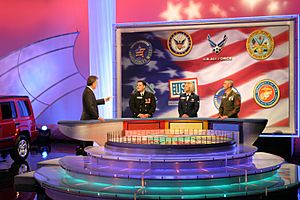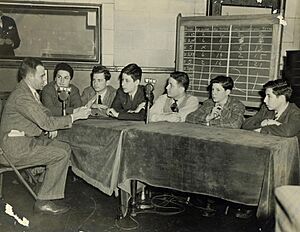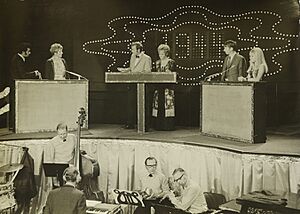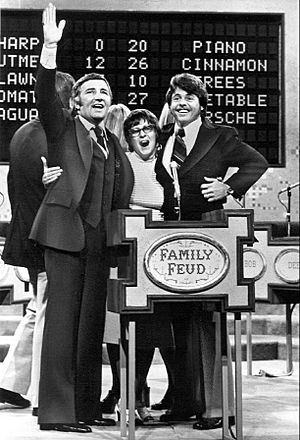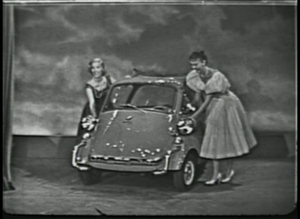Game show facts for kids
Game shows are exciting TV programs where people compete to win cool prizes! Imagine answering tricky questions or solving fun puzzles, all while trying to win cash, trips, or other awesome rewards. A friendly host guides everyone through the game, explaining the rules and keeping things exciting.
These shows first appeared on radio and early television in the late 1930s. By the 1950s, they became super popular in the United States, especially during the day. In a true game show, winners are decided by how well they complete tasks or answer questions, not by audience votes or judges. Sometimes, famous people even join in the fun!
Contents
What Makes a Game Show?
Game shows are usually about winning prizes in a single episode. Sometimes, if you're really good, you can keep playing and win even more! For example, on Jeopardy!, champions can continue to play as long as they keep winning.
Game Shows vs. Reality Competitions
It's important to know the difference between a game show and a reality competition show.
- Game shows decide winners based on clear tasks, questions, or puzzles. There's usually no judging panel or audience voting.
- Reality competition shows often last many episodes and involve judges or votes to decide who wins. Shows like American Idol or America's Got Talent are reality competitions, not game shows.
Hybrid Game Shows
Some shows mix elements of both! These are called "reality game shows." They involve completing physical challenges or tasks to move forward, but still don't use voting. Think of shows like American Ninja Warrior or Double Dare. They are exciting challenges where your skills determine if you win.
The History of Game Shows
Game shows have a long and interesting past, starting almost a century ago!
Early Days: 1930s to 1950s
The very first game shows appeared on radio and early television in the late 1930s.
- Spelling Bee was one of the first TV game shows in 1938.
- Information Please was an early radio game show from the same year.
- Dr. I.Q., a radio quiz show, became a big hit starting in 1939.
By the 1950s, as more homes got televisions, game shows became a regular part of TV. Some shows offered smaller prizes during the day, while others with bigger prizes aired in the evenings. However, in the late 1950s, some quiz shows faced problems because they were not always fair. This led to many of them being canceled.
Panel Shows: A Different Kind of Game
Even after these issues, a type of game show called a panel show remained popular. On these shows, a group of famous people would try to guess facts about a guest or answer questions. Shows like What's My Line? were very successful. Panel shows are still popular today, especially in the UK, where comedians often make them very funny!
A New Era: 1960s and 1970s
Game shows continued to be popular on daytime TV in the 1960s. New shows like Jeopardy! (1964) and Let's Make a Deal (1963) debuted. Other popular shows included Hollywood Squares and Password.
In the late 1960s, color TV came to game shows, making them even more vibrant. The 1970s brought a big comeback for game shows with new versions of classics and brand-new hits.
- The New Price Is Right started in 1972 and became a huge success.
- Match Game became "Big Money" Match Game 73 and led to the spin-off Family Feud in 1976.
- Wheel of Fortune first aired in 1975.
Many of these popular daytime shows also created "nighttime" versions that aired five days a week.
The Rise of Syndication and Cable: 1980s and 1990s
In the 1980s, game shows started to change. Many moved from network TV to syndication, meaning local stations could air them at different times. Wheel of Fortune (1983) and a new Jeopardy! (1984) became incredibly successful in syndication and are still popular today.
Cable TV also brought new game shows like Supermarket Sweep and Double Dare on Nickelodeon. In 1994, the Game Show Network launched, showing reruns of classic game shows.
In the UK, game shows remained very popular throughout the 1990s. Rules about prizes became less strict, allowing for bigger and more exciting games.
The Million-Dollar Craze
In 1998, the British show Who Wants to Be a Millionaire? premiered, offering a huge prize of £1,000,000. It was a massive hit! This success inspired an American version in 1999, which also became very popular. This led to a "million-dollar game show craze" around the year 2000, with many new shows offering large prizes. While many of these new shows didn't last long, they paved the way for reality TV competitions where contestants could win big money.
Modern Game Shows: 2000s to Today
Today, shows like Wheel of Fortune, Jeopardy!, and Family Feud are still going strong. To keep things exciting, Jeopardy! increased its prize amounts and removed limits on how much a contestant could win.
Record-Breaking Winners
In 2004, Ken Jennings became a Jeopardy! superstar, winning 74 games in a row and setting a record for the longest winning streak on any US game show. He won over $2.5 million! Other champions like Brad Rutter, James Holzhauer, Matt Amodio, and Amy Schneider have also won millions on Jeopardy!.
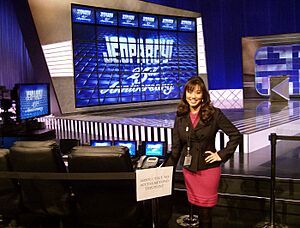
Family Feud also saw a big boost in popularity when Steve Harvey became its host in 2010.
In recent years, many classic game shows have returned to prime-time TV with new versions. Shows like Celebrity Family Feud, The $100,000 Pyramid, and Match Game have made a comeback. New game concepts also continue to appear, keeping the genre fresh and exciting!
Game Shows Around the World
Game shows are popular all over the globe! Many show formats that are hits in one country are adapted for audiences in other countries. For example, a company called Reg Grundy Organisation bought rights to American game shows and made versions for places like Australia.
Japanese Game Shows
Japanese game shows have a unique style. They often include wild physical challenges and athletic competitions, making them very different from typical quiz shows. This style has even inspired shows in other countries.
Prizes and How They Work
The prizes you see on game shows come from different places.
- Product Placement: Many prizes, like cars or appliances, are provided by companies who want to show off their products.
- Insurance: For really big prizes, like a million dollars, the show might buy "prize insurance." This means an insurance company pays if someone wins the huge prize, so the show doesn't have to pay it all themselves.
In the past, there were rules about how much money could be given away on game shows, especially after the fairness issues in the 1950s. These rules limited how much a player could win or how many times they could appear. However, these restrictions were mostly lifted in the 1990s, which helped lead to the "million-dollar craze" we talked about earlier.
The Bonus Round
Many game shows have a special part at the end called a bonus round (or "end game"). This is where the winner of the main game gets to play for even bigger prizes!
The bonus round usually has different rules and challenges than the main game. It's designed to be tougher and more exciting.
- One of the earliest bonus rounds was on Beat the Clock, where a couple's wife would unscramble words for a prize.
- Password introduced the "Lightning Round" in 1961, where contestants quickly guessed words for extra cash.
Game show producer Mark Goodson helped make bonus rounds a standard part of game shows. He believed that shows needed "something more" to keep audiences hooked. Now, almost every game show has an exciting end game!
See also
 In Spanish: Programa de concursos para niños
In Spanish: Programa de concursos para niños
- Game Show Network (a TV channel just for game shows)
- Buzzr (a network showing classic game show reruns)
- Challenge (a British game show network)
- GameTV (a Canadian game show network)
- UKGameshows.com, a British website about game shows
- List of game show hosts
- List of American game shows
- List of international game shows
- Lists of television programs
- Panel show
- Quiz Show (a movie about game shows)
- Reality television
- Daytime television in the United States
- American game show winnings records
- Video games
 | Isaac Myers |
 | D. Hamilton Jackson |
 | A. Philip Randolph |


